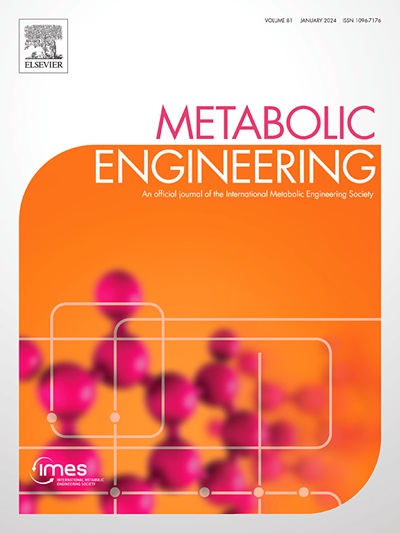Not all cytochrome b5s are created equal: How a specific CytB5 boosts forskolin biosynthesis in Saccharomyces cerevisiae
IF 6.8
1区 生物学
Q1 BIOTECHNOLOGY & APPLIED MICROBIOLOGY
引用次数: 0
Abstract
Cytochrome B5s, or CytB5s, are small heme-binding proteins, ubiquitous across all kingdoms of life that serve mainly as electron donors to enzymes engaged in oxidative reactions. They often function as redox partners of the cytochrome P450s (CYPs), a superfamily of enzymes participating in multiple biochemical processes. In plants, CYPs catalyze key reactions in the biosynthesis of plant specialized metabolites with their activity dependent on electron donation often from cytochrome P450 oxidoreductases (CPRs or PORs). In eukaryotic microsomal CYPs, CytB5s frequently participate in the electron transfer process although their exact role remains understudied, especially in plant systems. In this study, we assess the role of CytB5s in the heterologous biotechnological production of plant specialized metabolites in yeast. For this, we used as a case-study the biosynthesis of forskolin - a bioactive diterpenoid produced exclusively from the plant Coleus forskohlii. The complete biosynthetic pathway for forskolin is known and includes three CYP enzymes. We reconstructed the entire forskolin pathway in the yeast Saccharomyces cerevisiae, and upon co-expression of the three CytB5s - identified in C. forskohlii transcriptomes - alleviation of a CYP-related bottleneck step was noticed only when a specific CytB5, CfCytB5A, was used. Co-expression of CfCytB5A in yeast, in combination with forskolin pathway engineering, resulted in forskolin production at titers of 1.81 g/L in a bioreactor. Our findings demonstrate that CytB5s not only play an important role in plant specialized metabolism but also, they can interact with precision with specific CYPs, indicating that the properties of CytB5s are far from understood. Moreover, our work highlights how CytB5s may act as indispensable components in the sustainable microbial production of plant metabolites, when their biosynthetic pathways involve CYP enzymes.
并非所有细胞色素 b5 都是相同的:特定的 CytB5 如何在酿酒酵母中促进福斯克林的生物合成。
细胞色素 B5s 或 CytB5s 是一种小型血红素结合蛋白,在生物界无处不在,主要作为电子供体供参与氧化反应的酶使用。它们通常是细胞色素 P450s(CYPs)的氧化还原伙伴,CYPs 是参与多种生化过程的酶超家族。在植物中,CYPs 催化植物特殊代谢物生物合成过程中的关键反应,其活性依赖于细胞色素 P450 氧化还原酶(CPRs 或 PORs)的电子捐赠。在真核微粒体 CYPs 中,CytB5s 经常参与电子传递过程,但它们的确切作用仍未得到充分研究,尤其是在植物系统中。在本研究中,我们评估了 CytB5s 在酵母异源生物技术生产植物特殊代谢物中的作用。为此,我们以福斯可林的生物合成为案例进行了研究,福斯可林是一种生物活性二萜类化合物,专门从植物鞘氨醇中提取。据了解,福斯可林的完整生物合成途径包括三种 CYP 酶。我们在酿酒酵母中重建了整个福斯可林的合成途径,在福斯可林转录组中发现了三种 CytB5,当它们共同表达时,只有在使用特定的 CytB5(CfCytB5A)时,才会发现与 CYP 相关的瓶颈步骤有所缓解。在酵母中联合表达 CfCytB5A 与福斯克林途径工程相结合,可在生物反应器中以 1.81 克/升的滴度生产福斯克林。我们的研究结果表明,CytB5s 不仅在植物特化代谢中发挥着重要作用,而且还能与特定的 CYPs 精确地相互作用,这表明人们对 CytB5s 的特性还知之甚少。此外,我们的工作还突显了当植物代谢物的生物合成途径涉及 CYP 酶时,CytB5s 如何成为可持续微生物生产植物代谢物过程中不可或缺的组成部分。
本文章由计算机程序翻译,如有差异,请以英文原文为准。
求助全文
约1分钟内获得全文
求助全文
来源期刊

Metabolic engineering
工程技术-生物工程与应用微生物
CiteScore
15.60
自引率
6.00%
发文量
140
审稿时长
44 days
期刊介绍:
Metabolic Engineering (MBE) is a journal that focuses on publishing original research papers on the directed modulation of metabolic pathways for metabolite overproduction or the enhancement of cellular properties. It welcomes papers that describe the engineering of native pathways and the synthesis of heterologous pathways to convert microorganisms into microbial cell factories. The journal covers experimental, computational, and modeling approaches for understanding metabolic pathways and manipulating them through genetic, media, or environmental means. Effective exploration of metabolic pathways necessitates the use of molecular biology and biochemistry methods, as well as engineering techniques for modeling and data analysis. MBE serves as a platform for interdisciplinary research in fields such as biochemistry, molecular biology, applied microbiology, cellular physiology, cellular nutrition in health and disease, and biochemical engineering. The journal publishes various types of papers, including original research papers and review papers. It is indexed and abstracted in databases such as Scopus, Embase, EMBiology, Current Contents - Life Sciences and Clinical Medicine, Science Citation Index, PubMed/Medline, CAS and Biotechnology Citation Index.
 求助内容:
求助内容: 应助结果提醒方式:
应助结果提醒方式:


